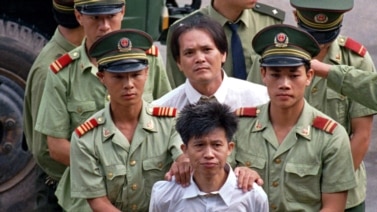
Judges in China sentence thousands of people to death every year. And China executes more people each year than any other country. However, the Chinese government has been lowering the number of crimes for which people can be executed.
In 2011, China removed 13 crimes from a list of crimes that could result in the death penalty. Earlier this year, China announced plans to remove nine more crimes from the list. They include counterfeiting and forcing someone to have sexual relations in exchange for money. These changes have caused a sharp drop in the number of people executed. The human rights group Dui Hua reports China executed 2,400 people last year. That is more executions than the rest of the world combined. But it is only 20 percent as many as in 2002. China executed 12,000 people that year.
Even with the changes, China’s execution rate is still much higher than that of any other country.
Nicholas Bequelin is a senior researcher with Human Rights Watch. He says China’s leaders know the country must change the way it deals with its citizens if it is to gain the respect of other countries.
“I think that China doesn’t want to be too much of an outlier in respect to human rights. It’s not ready to embrace and accept and enforce respect for human rights when it’s inconvenient for the Communist Party or for the one-party system, but otherwise I think that China by and large accepts the validity of human rights norms and wants to be a member in good standing in the international community.”
Human rights groups say even though China has reduced the number of people it executes, the country’s judicial system does not release much information. This makes it difficult to know the truth about how many people are executed. The rights group Amnesty International says an increasing number of people are being executed in Xinjiang province, where anti-government protests have taken place. William Nee is a researcher with Amnesty International.
“And it looks like, from all indications, that the number of people receiving the death penalty and being executed has increased quite dramatically in that region in the last year. So that, in, to some extent, may offset some of the apparent decline in the, in the number of people getting the death penalty and being executed.”
I’m Christopher Cruise.
Correspondent Shannon Van Sant reported this story from Beijing. Christopher Cruise wrote this story for Learning English. Jonathan Evans was the editor.
Words in This Story
counterfeit – v. to illegally make an exact copy of something in order to trick people
outlier – n. a statistical observation that is very different in value from the others of the sample; often used figuratively, as in one that exists outside or at an extreme of a category, pattern, or expectation
embrace – v. to accept something or someone readily or gladly
inconvenient – adj. causing trouble or problems; not convenient
by and large – adv., idiom for the most part; generally
validity – n. the quality of being real or correct
offset – v. to cancel or reduce the effect of something
Do you support or oppose the death penalty? Are your feelings about the death penalty affected by the crime that was committed? We want to hear from you. Write to us in the comments section.

